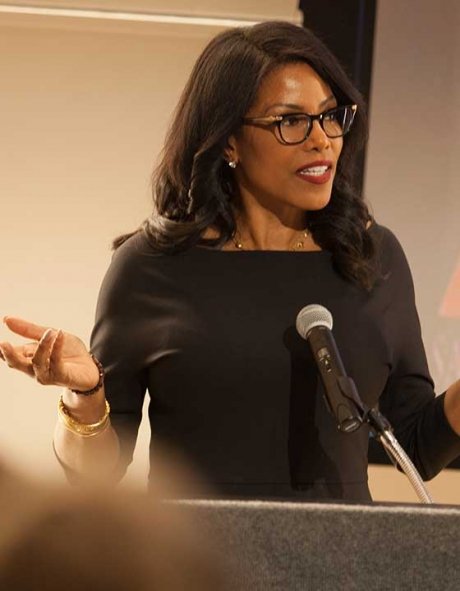Daughter of Slain Activist Malcolm X Addressed Young Leaders of Tomorrow
- News & Events
- News
- Daughter of Slain Activist Malcolm X Addressed Young Leaders of Tomorrow

“In 1965 my mother witnessed the political assassination of her husband. She placed her entire body over my sister and me to protect us from the gunfire and to make sure we did not see.”
These were the poignant words of Ilyasah Shabazz, the third eldest daughter of Malcolm X and the featured guest speaker for Black History Month at Rhode Island College. This lecture, held on Feb. 12, was sponsored by Harambee, the RIC Black student organization, and the Rhode Island College Division for Student Success.
The auditorium was filled to capacity as Shabazz shared the legacy of her late parents and encouraged young leaders of tomorrow to continue the struggle for human rights.
“People often ask me, ‘What did he [Malcolm X] do?’” Shabazz said. “My father redefined the American civil rights movement to include a human rights agenda.” He “circled the globe tirelessly,” she said, in search of solutions to the problem of racism in which a brother can oppress a brother “simply because of the melanin in his skin and the mineral resources in his land.”
In the end, Malcolm X was an activist who called for human rights for all people.
When he was gunned down in a lecture hall in 1965, his wife, Betty Shabazz, was pregnant with twins and had four other small children in tow. Ilyasah Shabazz noted that people wonder how her mother could survive such adversity or how the wives of other fallen leaders like Coretta Scott King, Myrlie Evers-Williams and Jacqueline Kennedy were able to overcome. “It is because my mother didn’t look upon herself as a victim,” Shabazz said. This is the legacy of my forebears, she said.
"Each and every one of us has a legacy,” she went on and urged the audience to construct a modern legacy of your own based on history and values, Shabazz said. In her own household, black history was a strong foundation.
When it comes to black history, “we are a miseducated nation,” she stated. “We have been intentionally miseducated about the historical truth of black life.”

The activist called for the incorporation of Black history into the educational curriculum rather than relegating it to one month out of the year.
“If we do not know our history in its entirety, then our education is incomplete, ladies and gentlemen," she said, "and we and all the children following will continue to suffer the disorder of detachment, separation from history, disconnection from culture, rejection of heritage and very likely a life without true passion, determination and purpose, wanting simply to be rich but not rich in service.”
Shabazz warned students in the audience not to get accustomed to relying on textbooks written by others to inform and educate them about themselves.
To the teachers in the audience, she declared, “We don’t blame you. We invite you to join us in being curious beyond the books that are put in front of you, about the greatness in each of the children whose fragile lives you hold in your hands.”
To the future leaders of the new world, she reminded them that the journey of the young leaders who preceded them is there to inspire them. Continue to seek solutions, she urged them, “establish clubs, meeting groups, organizations, plan, strategize, organize,” noting that simply tweeting social justice commentary does not an activist make.
“Sometimes we complain that we no longer have effective leaders. We are the leaders that we seek,” she said.
RIC President Frank D. Sánchez, noted that it is the accomplishments of leaders like Ilyasah Shabazz that “inspire others to either do better or the same. Education is so essential, so vital, to advancing our nation, the world and all of humanity. Our institutions of higher education are places where we can strengthen our communities, come together to have honest conversations and learn from people that are different from ourselves.”
